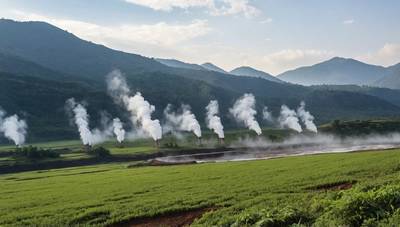India launches its first national policy on geothermal power
India launched Monday its first national policy for geothermal power, joining the growing list of countries that are relying on underground heat to drive their clean energy transitions.
The Ministry of New and Renewable Energy in India said that the policy is designed to unlock India's geothermal potential, which has been untapped. This will be done through incentives and regulations.
The use of ground-source heat pumps to provide heating and cooling and to repurpose abandoned oil and natural gas wells is also encouraged.
Why it's important
Germany has accelerated its geothermal expansion, and Big Tech firms in the U.S. are searching for low-carbon energy to fuel AI growth.
MNRE has said that India has identified 381 geothermal springs in 10 provinces including Ladakh Himachal Pradesh Gujarat.
The policy encourages geothermal joint ventures with oil, gas and mineral companies and offers fiscal incentives, such as import duty exemptions, tax holidays and viability gap financing.
CONTEXT
Geothermal energy is a conventional method of generating electricity. It involves drilling into the earth and releasing hot brine that produces steam.
According to the U.S. Energy Information Administration, these plants emit 99% less CO2 than fossil fuel-based electricity.
By the Numbers
The MNRE reported that the global geothermal power capacity was 15.4 GW by 2024. This is led by the United States and Indonesia, followed closely by the Philippines.
According to the policy document, India intends to contribute to this increase through 100% foreign direct investments, concessional loans, and international collaborations.
MNRE stated that the policy would support geothermal projects up to 30 year, with possible extensions depending on the availability of resources. (Reporting and editing by Sethuraman N; Krishna CHandra Eluri).
(source: Reuters)






